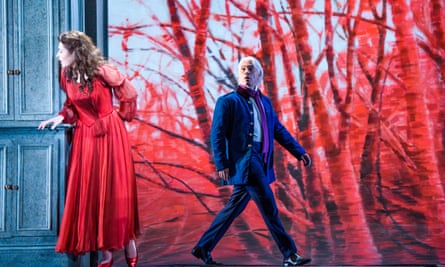
The theater lights dimmed, and the hush of anticipation swept across the hall. On stage, a man stood tall, silver hair gleaming beneath the spotlight, dressed in the dark, aristocratic costume of Tchaikovsky’s greatest anti-hero. Then, with a breath as deep as the Russian night, Dmitri Hvorostovsky began Onegin’s Aria—and the world seemed to stop.

The Role of a Lifetime
For many, Dmitri Hvorostovsky was the definitive Eugene Onegin. From the first moment he stepped into the role, his presence seemed almost fated. Tall, handsome, magnetic, with that signature mane of white hair and a baritone that combined velvet smoothness with iron strength—he was the embodiment of Pushkin’s proud, conflicted nobleman.
Onegin, aloof and careless, rejects young Tatiana’s love, only to realize years later that he has thrown away the one true happiness of his life. His aria, sung in the opera’s final act, is not just a plea but a confession—an outpouring of regret and longing. It requires more than technical brilliance; it demands raw honesty. Hvorostovsky gave it all.
The First Notes
The orchestra began softly, a restless undercurrent of strings that mirrored Onegin’s inner turmoil. Hvorostovsky’s baritone entered low and subdued, as though he were speaking directly to Tatiana, directly to the audience.
“Lyubvi vse vozrasty pokorny…” (“Love is subject to every age…”)
The words fell heavy, carved in sorrow. Hvorostovsky sang not as a performer, but as a man begging for forgiveness. His voice trembled slightly—not from weakness, but from the weight of emotion.

A Study in Control
Hvorostovsky’s genius was in his control. Each phrase built upon the last, his baritone deepening in color, growing in urgency. He shifted seamlessly from quiet introspection to soaring desperation, painting Onegin’s psychological collapse in sound.
His breath control allowed lines to stretch impossibly long, each one an unbroken thread of anguish. His diction was crystalline, each Russian consonant sharpened into meaning. And yet, behind the precision lay vulnerability.
For audiences, it felt less like watching an aria and more like intruding on a man’s private confession.
A Face That Spoke Volumes
Opera is not only heard but seen, and Hvorostovsky’s face told as much as his voice. His eyes darkened with guilt. His hands trembled as they reached toward the empty space where Tatiana might have been. At moments, he stood frozen, paralyzed by memory, before exploding into movement as though trying to chase time itself.
The white mane, the chiseled features, the aristocratic bearing—all served the role. He was Onegin, not in caricature but in truth: proud, broken, human.
The Crescendo of Regret
As the aria climbed toward its peak, Hvorostovsky unleashed the full force of his instrument. His baritone surged with urgency, filling the hall with sound that was both commanding and desperate. Each note seemed torn from his chest, as though the music itself were wounding him.
When he cried out for Tatiana’s forgiveness, the hall shook with emotion. Many in the audience were seen wiping away tears. They were not just hearing a character—they were hearing Dmitri himself, pouring every fiber of his being into one final plea.
Silence, Then Thunder
The aria ended not with triumph, but with defeat. Hvorostovsky stood still, chest heaving, eyes cast downward. For a heartbeat, there was silence—an entire theater too moved to breathe.
And then the ovation erupted. Thunderous applause, bravos shouted into the night, a standing ovation that seemed it might never end. Hvorostovsky bowed deeply, hand over heart, acknowledging not just the applause but the shared moment of truth.
A Role Etched in Memory
Critics and fans alike have long said that Hvorostovsky’s Onegin was definitive. His voice—velvet yet edged with steel—captured both the elegance and the torment of the character. His acting, understated but devastating, gave depth to a role that can so easily fall into coldness.
But perhaps most importantly, he made Onegin’s aria universal. It was no longer just about a Russian aristocrat’s regret. It was about human frailty, the pain of missed chances, the haunting of “what might have been.”
Epilogue
Years later, as illness overtook him, Hvorostovsky returned again and again to Onegin. Even when his body weakened, his voice retained its power, his artistry its depth. For him, the aria was more than a role. It was a mirror—a reminder of life’s fragility, love’s endurance, and the inevitability of regret.
When he sang it, he gave audiences more than music. He gave them himself.
And that, perhaps, is why his Onegin will never be forgotten. In velvet and steel, in sorrow and grace, Dmitri Hvorostovsky sang not just of Onegin’s fate, but of our own.